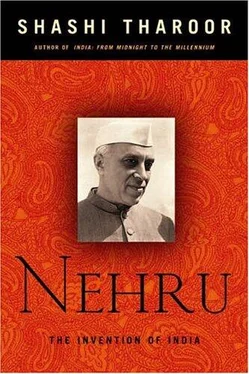first government of indepen-
dent, 156–58
foreign policy of, under
Nehru, 182–91, 207–13
governmental corruption in,
204–6
history of, 127
interim government for, 141–
49, 152
negotiations for independence
between Britain and, 83–
88, 139–47, 153–55
newly independent, 161–68
partition of, 135, 139–40,
143–49, 151–55, 161–62
pluralism of, 225–26
progress in, 251
relations between China and,
55–56, 188, 189, 209–13
relations between Pakistan
and, 167, 169–70
role of religion in, 234–39
socialism in, 241–46
state boundaries in, 173
war between China and, 210–
13
during World War II, 116–24
Indian Civil Service (ICS), 17
Indian Defense Force, 26
Indian democracy
disillusionment with, 231–32
Nehru’s influence on, 220–31
political parties in, 229–30
role of caste in, 236–39
strength of, 232
Indian Institutes of Technology,
245
Indian masses
adulation of Nehru by, 44–45,
65, 99–100, 222
Indian National Congress and,
24, 34–35, 46–47, 104–9,
114, 119–20, 130, 141,
143–45, 147–48
interim government and, 148
Khilafat movement and, 34–
35
overview of, xv — xvi
success of, in elections, 134–
35
on war issue, 118–20
Mussolini, 97, 112
Naidu, Padmaja, 201, 258
Naidu, Sarojini, 24, 71, 120, 258
Narayan, Jayaprakash, 166, 171,
259
Nash, Ogden, 207–8
Nasser, Gamal Abdul, 186, 189–
90, 208
National Conference, 142
nationalism, 101, 107
National Volunteer Corps, xvi
Nehru, Indira Priyadarshini
(daughter). See Gandhi,
Indira Nehru
Nehru, Jawaharlal
adulation of, by Indian masses,
44–45, 65, 99–100, 222
antireligious feelings of, 47–
48, 92, 107–8, 233–34
birth legend of, 1–3
Bose and, 115
British view of, 68–69, 84, 93–
94
calls for a free India by, 76–77,
78
campaigning by, 99–103
childhood influences on, 3–4,
6–7, 8
on creation of Pakistan, 149
criticism of, 202, 207–8, 220,
223–24
death of, 214–17
on death of Gandhi, 160–61
development of political
thought in, 52–59
disillusionment of, 47–48
early life of, 3–18
early political interests, 23–24,
50–52
education of, 8, 9–11, 13–15,
17–18
election of, to chairmanship of
Allahabad Municipal
Board, 50–52
election of, to presidency of
Indian National
Congress, 69–75, 97–98,
100, 138
Englishness of, 223–24
family origins of, 4–6
family relationships of, 20–21,
52, 88, 95
family tree of, xix
financial problems of, 98
Gandhi and
compromises between, 67,
93, 97
differences between, 43–44,
53, 59–62, 84–85, 92,
94
father-son relationship of,
138, 228
loyalty between, 29–30, 35–
39, 138
power relations between,
69–70, 99
grief of, over death of father,
91–92
health problems of, 52, 89
Joshi, Haveli Ram, 214
Kai-shek, Chiang, 117, 123
Kashmir, 4–5, 141–43, 164–65,
203
Kashmiri Pandits, 4–5
Kaur, Rajkumari Amrit, 205–6
Kennedy, John F., 206–7
Khaliquzzaman, Chaudhuri,
106–7, 256
Khan, Hakim Ajmal, 47
Khan, Khan Abdul Ghaffar, xvi,
109, 256
Khan, Liaquat Ali, 169, 257
Khan, Sir Sikandar Hyat, 130,
257
Khan, Sir Syed Ahmed, 104
Khare, N. B., 223–24
Khilafat movement, xiv, 34–35,
36, 46
Khudai Khidmatgars, 109
Kidwai, Rafi Ahmed, 171, 257
Kisan Sabhas, 39
Kohat killings, 47
Kripalani, Acharya J. B., 138,
171, 257
Krishak Mazdoor Praja Party, xvi
Krishnamachari, T. T., 205
Labour Party, 57
Lansbury, George, 56
Laxman, R. K., 182
Lee Kuan Yew, 250
Liberal Party, xv
Lincoln, Abraham, 251
Linlithgow, Lord, 113, 116, 118–
21, 124, 257
Lucknow Congress, 24, 174
Lucknow Pact, 24
MacDonald, Ramsay, 82
Mahalanobis, P. C., 244
Maharajsingh, Rao, 20
Mahmud, Syed, 43–44, 127,
197–98, 199, 227, 257
Malaviya, K. D., 42, 258
Malaviya, Pandit Madan
Mohan, 2
Malik, Charles, 191
Malraux, André, 201–2, 229
Mao Tse-tung, 117
Marxism, 174
Mathai, M. O., 205
McMahon Line, 209, 210, 211
Menon, V. K. Krishna, 152n,
210–11, 212, 258
monarchical rule, 115–16
Montagu-Chelmsford reforms,
25n, 36
Moplah rebellion, 47
Moraes, Frank, 150, 205
Morris, William, 13
Mountbatten, Edwina, 137, 150,
153, 162–63, 169, 198,
201, 258
Mountbatten, Lord, of Burma,
137, 149–50, 152–56,
162–64, 168, 258
Muenzenberg, Willi, 54–55
Muggeridge, Malcolm, 223
Mukherji, Shyama Prasad, 156
Mullick, B. N., 211
Muslim League
British support for, 73, 103–4,
130, 134–35, 147–48,
152
demand for creation of
Pakistan by, 119, 148–49
Muslim League ( continued )
hatred of Hindus expressed by,
139
in independent India, 235
relationship with daughter,
81–82, 128–29, 194–95,
231–32
relationship with father, 15–
16, 18, 50, 80–81, 129
returns to India, 19–21
socialist policies of, 174–79
spendthrift habits of, 14–15,
16, 38
travels of, 16, 22–23, 52–59,
112–14, 137
on war issue, 116–24
writings of, 46, 54, 56–57, 78–
79, 81–82, 90–91, 95–97,
122, 127
Nehru, Kamala Kaul (wife), 21–
22, 37–38, 52–54, 76, 82,
94–96, 127–28, 259
Nehru, Krishna (sister), 7–8, 76,
98, 128, 204
Nehru, Motilal (father)
about, 259
death of, 79–80
desire for son by, 1–2
financial problems of, 37,
38
Gandhi and, 29–30, 49
health problems of, 79
imprisonment of, 42–43, 44,
77–78
influence of, on Jawaharlal,
6–7, 80–81
investigation of Amritsar
Massacre by, 33–34
modern views of, 3–4, 9
Nehru Report of, 65–66, 67,
71
political activities of, 12, 24,
33–37, 48–49, 65–66, 69,
73
political differences between son and, 48–49, 56, 66
pride of, in son, 15, 44–45 relationship between
Jawaharlal and, 15–16,
18, 50, 129
success of, 5–6
Nehru, Swarup Rani (mother),
1, 2, 3, 6, 8–9, 22, 90,
112
Nehru Report, 65–66, 67, 71
Nehruvianism, 219–20
Nepal, 190
Nkrumah, Kwame, 199–200
Nonaligned movement, 151,
184, 186, 188–89, 208,
246–48
noncooperation movement, 27,
35, 36–37, 41–42, 43, 46,
120–21
nonviolence principle, 46
no-rent campaign, 88
Pakistan
British alliance with, 164–65
call for creation of, 119, 145–
46, 148–49
China and, 209
creation of, 154
debate over fate of, 139–40
Jinnah and, 139, 145–46, 148,
154
Muslim desire for, 135
Nehru on creation of, 135,
139–40, 143–45, 153–55
relations between India and,
167, 169–70
violence in creation of, 145–
49, 151–52, 155, 161–62
Pal, Bipin Chandra, 13–14, 30,
259
Hindu-Muslim relations and,
93, 167–68
identification with Indian
Читать дальше












